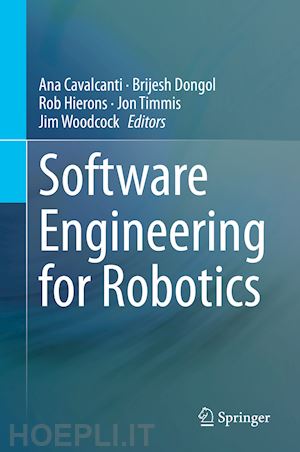

Questo prodotto usufruisce delle SPEDIZIONI GRATIS
selezionando l'opzione Corriere Veloce in fase di ordine.
Pagabile anche con Carta della cultura giovani e del merito, 18App Bonus Cultura e Carta del Docente
The topics covered in this book range from modeling and programming languages and environments, via approaches for design and verification, to issues of ethics and regulation. In terms of techniques, there are results on model-based engineering, product lines, mission specification, component-based development, simulation, testing, and proof. Applications range from manufacturing to service robots, to autonomous vehicles, and even robots than evolve in the real world. A final chapter summarizes issues on ethics and regulation based on discussions from a panel of experts.
The origin of this book is a two-day event, entitled RoboSoft, that took place in November 2019, in London. Organized with the generous support of the Royal Academy of Engineering and the University of York, UK, RoboSoft brought together more than 100 scientists, engineers and practitioners from all over the world, representing 70 international institutions.
Theintended readership includes researchers and practitioners with all levels of experience interested in working in the area of robotics, and software engineering more generally. The chapters are all self-contained, include explanations of the core concepts, and finish with a discussion of directions for further work.
Chapters 'Towards Autonomous Robot Evolution', 'Composition, Separation of Roles and Model-Driven Approaches as Enabler of a Robotics Software Ecosystem' and 'Verifiable Autonomy and Responsible Robotics' are available open access under a Creative Commons Attribution 4.0 International License via link.springer.com.
Jon Timmis is Professor of Intelligent and Adaptive Systems at the University of Sunderland, where he is Deputy Vice-Chancellor, and is Visiting Professor at the University of York. His research focuses on biologically-inspired systems and modelling, with applications in robotic and swarm robotic systems as well as computational biology. He has commercialized his research into modelling and simulation in the biosciences. He is a former Royal Society-Wolfs on Research Merit Award holder and a Royal Academy of Engineering Enterprise Fellow.
Jim Woodcock is Professor of Software Engineering at the University of York, known for his research, teaching, and consultancy in the application of industrial-scale software engineering and formal methods. He is a Chartered Engineer, a fellow of the UK Royal Academy of Engineering, and a member of the London Mathematical Society. His current research is in modelling and reasoning about uncertainty in robotic applications.











Il sito utilizza cookie ed altri strumenti di tracciamento che raccolgono informazioni dal dispositivo dell’utente. Oltre ai cookie tecnici ed analitici aggregati, strettamente necessari per il funzionamento di questo sito web, previo consenso dell’utente possono essere installati cookie di profilazione e marketing e cookie dei social media. Cliccando su “Accetto tutti i cookie” saranno attivate tutte le categorie di cookie. Per accettare solo deterninate categorie di cookie, cliccare invece su “Impostazioni cookie”. Chiudendo il banner o continuando a navigare saranno installati solo cookie tecnici. Per maggiori dettagli, consultare la Cookie Policy.